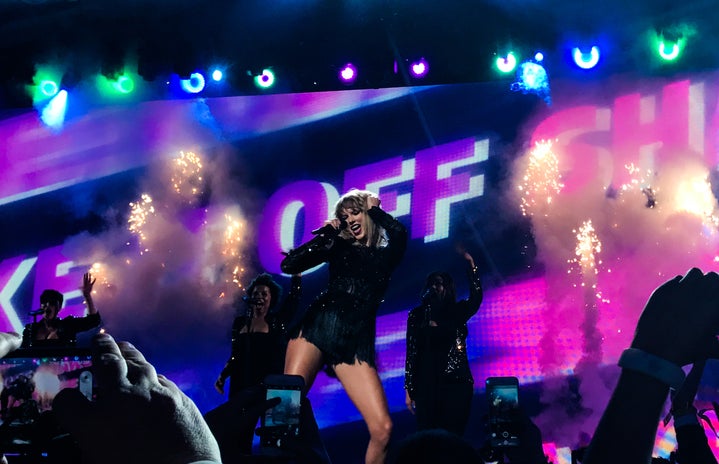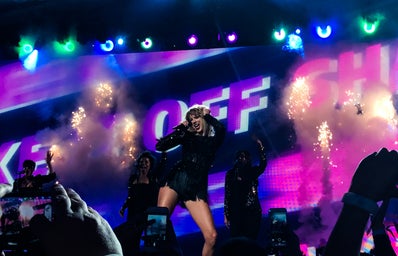For many years throughout my childhood and into my adolescence, I lived through so many pop-culture defining moments. From the growth of Taylor Swift into a worldwide star, to the absolute blockbuster hit of the Twilight series, I think it is acceptable to say that I have witnessed my fair share of movements in media that have reimagined pop culture.
However, with the growth of so much new media catered towards women and young girls, I learned that more often than not, those artists, movies, or books that seemed so great to me always came with its fair share of judgement.
Too many times to count I watched as others made fun of myself and my friends for enjoying the music of Justin Bieber or One Direction. I watched this happen so often that- in fact- I learned to hate these things too.
In middle school, there were times where I chose to ‘hate’ the very things that I enjoyed because it was easier to be liked by others than to express my interest in the movies or artists that I loved.
So much hatred surrounded certain emblems in media, that a lot of young girls (like myself at the time) were characterized as obsessive, annoying, and childish for buying and wearing merchandise for the shows, artists, and books that they enjoyed.
As I have grown into a young adult, I have watched as my younger cousins have had to experience the same type of treatment from their classmates or friends. I’ve learned that the issue isn’t that Twilight was childish or that Justin Bieber is a bad singer, it’s that society tends to hate the things that are made for teenage girls and women.
It began with hating female-centered media, but those very thoughts that stem from the learned hatred of all of those shows, movies, or artists often shifts into a dangerous misogynistic mindset.
I know it’s hard to digest how one hating Taylor Swift because she makes ‘bad music’ can turn into misogynistic thoughts, but I’ll give you one example. I’m sure we all remember the 2016 drama between Kim Kardashian, Kanye West, and Taylor Swift. When the original- heavily edited- recording of their phone conversation was leaked, the world was quick to turn on Taylor, calling her snake, a liar, and attack her art.
While Kim had illegally leaked a private recording and released snippets that were edited together to incriminate Taylor, the hatred was so strong that Taylor was forced to stay away from the public eye for years. The media completely obliterated her that year, putting a strain on the career that she had built herself while she dealt with a sexual assault case and her mother’s cancer treatments.
While I was a fan of hers, I watched as my friends and classmates called her a liar, a bad singer, and a snake, and at times, I fell victim to those very same words. Too many times I gave into pushing the narrative of her as an evil, calculated woman.
In 2020, the full unedited phone conversation between Kanye and Taylor was released, and Taylor’s original statement was corroborated that she in fact was not aware of Kanye’s use of the lyrics ‘I made that bitch famous.’ However, this was not as widely broadcasted in the media.
What I mean to say by this example is that while Kim and Kanye clearly planned a public, premeditated, and purposeful attack against her, Taylor was still the one named conniving, calculated, and deceitful. Rather than acknowledging both shortcoming of each party involved, the world was quick to turn their back on Taylor, a dislike that I would argue stemmed from years of hating her fans and music.
Whether one realizes or not, this can breed a sense of hatred toward women in many situations. When a man has casual sex he is desirable, a playboy, and elevated. When a woman does the same, she is called a whore, a slut, or any variation of this. A man can be respected and sexual, but a woman can only be one at a time. You see, it begins with hating women like Taylor Swift and Stephenie Meyer, for it is those very same conversations between friends and classmates that perpetuate the misogyny that is so prevalent in our society.
If a young girl wears a shirt of their favorite boyband they are made fun of, but if a boy wears a shirt of an rapper they enjoy, they are accepted and complimented. In reality, both of them are simply just trying to wear and partake in the media they enjoy.
The purpose of bringing up these points is not to say that we should hate those things directed towards men or start to bash media catered towards men, but to simply acknowledge that a problem does exist.
Fixing this issue, however, needs to be done by reprogramming our own internalized misogyny. In my personal experience, I needed to stop contributing to conversations that marked women as whores for having casual sex. I had to interject when I started to let myself hate things like K-pop. Hating the very things that are made for women fuels the hatred towards women, and when you feel yourself drifting into a train of thought that may lead in this direction, it is important that you stop and consider if you truly dislike the topic in question or if you are simply influenced by the world around you.
It took me years to acknowledge my own internalized misogyny and reprogram my thoughts. Even today, I am still learning ways that I can empower women and embrace female directed media, but we owe it to ourselves and our friends, mothers, sisters, and important women in our lives to treat them, and their media, with dignity and respect.
Too many years I looked down on those who enjoyed things like Twilight. We have to not only apologize to those we have hurt in the process of attempting to fit society’s mold, but also ourselves for our own internalized misogyny.



